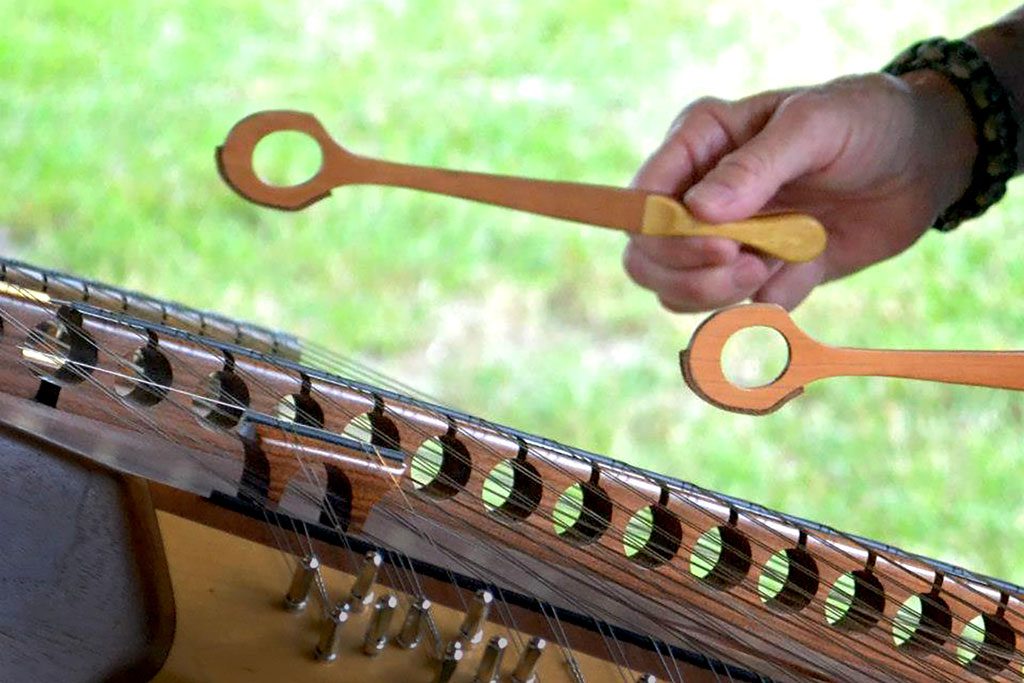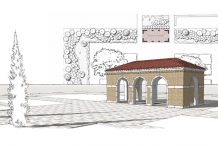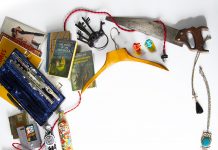The harmonies – angelic, spiritual, tranquil – produced by a hammered dulcimer evoke many passions, especially by those who play or build it.
A hamlet in southeastern Oklahoma supplies much of that musical ambrosia. About a dozen professional makers of the instrument exist in America … and two are in Bennington, arguably the dulcimer capital of the United States.
Russell Cook, owner of Master Works, says the hammered dulcimer (“the great-great-grandfather of the piano”) originated in the Middle East more than 2,500 years ago. Annette Lindsey, Cook’s sister and whose husband and daughter operate David’s Dulcimers, reminds that the instrument’s name derives from dulce melos, Latin for sweet melody.

“It’s the sound you’ll hear in heaven,” Lindsey says. “It’s a soothing sound.”
Her brother says the hammered dulcimer “stirs something in people’s hearts, in their souls. It’s like love at first sound.”
The siblings became interested in the instrument in 1978, but they have different experiences and don’t see the companies as competitors.
Lindsey’s husband, David, and their daughter, Cara, handcraft about 80 dulcimers yearly. Their retail instruments are heavy and suited to quick songs requiring what dulcimer players call a short sustain – the brief sound lingering after the note is struck by the hammer.
“We play old-time dances and re-enactments with fast songs, so you don’t want the sustain to go into the next note,” Lindsey says.
Cook’s company, with national and international sales on the wholesale level, produces about 325 handcrafted dulcimers annually. His are light with a long sustain, appropriate for ballads and hymns.
“You don’t have to play it a mile a minute,” he says. “It has rich overtones.”
Lindsey is a driving force in the Red River Valley Dulcimer Club, which has its 17th annual Winter Creek Reunion on her farm Oct. 4-7. She says the club and the festival came about unexpectedly.
She, her husband and daughter moved to Bennington in 1999. After a performance, they posted a ledger for people interested in their music. More than 30 actual dulcimer players signed up, and the club was born.
In 2002, the Lindseys converted a building into a production facility on their farm along Winter Creek; they called a few dulcimer friends to help.
“Others found out and wanted to come, too,” Lindsey says. “They’d say, ‘What’s going on at your place that we don’t know about?’ About 20 people showed up. We’d work some, then play some, and that’s how the reunion came about.”
For Cook, the hammered dulcimer has allowed him to perform throughout North America after he won the national title in 1981 in Winfield, Kansas.
“That’s when I decided I was going to make a go in the dulcimer business,” says the former science teacher and credit manager, who has sold hundreds of thousands of albums over the years.
He teaches and plays at venues nationwide, and Master Works is one of three companies allowed to sell instruments at the Winfield event.
Lindsey and Cook say the hammered dulcimer has contradictory appeals.
“It’s a simple instrument,” Lindsey says. “It’s diatonic, not chromatic like a piano. You just have sharps and flats. We can teach someone a song in five minutes. I’ve done it lots of times.”
Cook admires its complexity.
“It has a composite of sound that no other instrument has,” he says. “It has percussion, sustain, overtone, volume and attack. It’s the only instrument that has all those elements.
“That’s why it’s been around forever.”

























